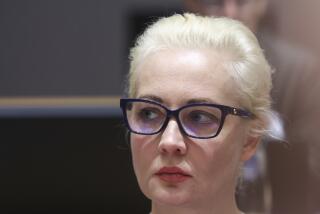Soviets’ Abortion Situation Described as ‘Abnormal’ : A Kremlin Quiz on Women’s Issues
- Share via
MOSCOW — The highest-ranking woman official in the Soviet Union revealed herself at a rare press conference Monday to be a cultural conservative whose husband does the housework while she puts in 12- to 14-hour days as a deputy premier and non-voting member of the ruling Communist Party Politburo.
Alexandra P. Biryukova, 59, who last October became the first woman elevated into top party office in more than 27 years, told Soviet and foreign reporters that the government plans to double or even triple the production of scarce consumer goods by the year 2005.
But the journalists seemed more interested in her views on women’s issues, peppering her during a 95-minute press conference with questions about the common use of women in heavy manual labor, opportunities for women in politics and the extraordinarily large number of abortions in the Soviet Union.
Humiliating Treatment
Out of all these issues, only the subject of abortions appeared to stir her. She called the current situation “abnormal,” the result primarily of inadequate supplies of contraceptives. Referring to a recently published letter from a woman who described her humiliating and painful treatment while seeking an abortion, Biryukova said she had ordered that the patient be located so that the doctors and clinics involved could be dealt with.
Government figures show that 90% of first pregnancies are aborted, and the total number of abortions here is reportedly many times higher than that in any other industrialized country--6.5 million a year, or about four times the number reported in the United States. An even higher Soviet figure, 8 million annually, was recently reported by the weekly publication Ogonyok.
Biryukova said the number of abortions each year is about equal to the number of births in the Soviet Union.
“It is abnormal, and we must correct this situation in the next two or three years by developing contraceptives,” she said.
As for the many women who work at such jobs as shoveling snow and repairing roads, the official acknowledged that “quite often I do see women working on jobs that should be occupied by men.” However, she added, “we have a whole program of eliminating female employment in heavy occupations,” and she predicted that “in a few years we’ll overcome that problem.”
Whether there are enough women in high party and government posts “depends on how you look at it,” she said. But she stressed that it is not only the male establishment that determines how far a woman can go in the Soviet system. “It depends also on the desire of the woman.”
Asked about the privileges attached to her high office, Biryukova smiled and said that the greatest privilege of all Soviet officials is to work tirelessly “to make our people happier, more free.”
As for recreation, she said, “I practically don’t have any leisure.” She said she works 12- to 14-hour days, often including weekends. She has no maid, she said. “My housework is done by my husband,” who is a retired military officer. The couple has no children.
Pressed for her opinion of exiled Soviet author Alexander Solzhenitsyn, Biryukova said that she had “not read a lot of his works, but I did read some of them. . . . Personally, I do not like Solzhenitsyn.”
She said she prefers the more elegant prose of the late Leo Tolstoy and Valentin Rasputin, a conservative, contemporary Russian author known among other things for his depictions of village life.
Born of peasant parents near Moscow, Biryukova studied at a textile institute and became a party member in 1956. She began full-time political work in the trade union movement, where she held progressively higher offices until becoming secretary of the Communist Party’s Central Committee responsible for overseeing light and consumer industries.
‘Tense’ Consumer Market
She continues to have special responsibilities in those areas as deputy premier and chairman of the government’s office of social development issues.
Echoing what has become a common theme among Soviet leaders, Biryukova stressed Monday that “the situation in the country’s consumer market is now tense.” She said the unsatisfied demand for goods and services here is estimated at the equivalent of more than $110 billion, equal to nearly five months’ output of non-agricultural consumer goods at current production rates.
Biryukova blamed the shortages on years of “one-sided orientation of the Soviet economy,” stressing production of industrial rather than consumer goods.
The government is trying to change that and recently decided to convert all or part of 300 enterprises in the machinery, defense, fuel and power industries to the production of consumer goods, she said.
More to Read
Sign up for Essential California
The most important California stories and recommendations in your inbox every morning.
You may occasionally receive promotional content from the Los Angeles Times.













